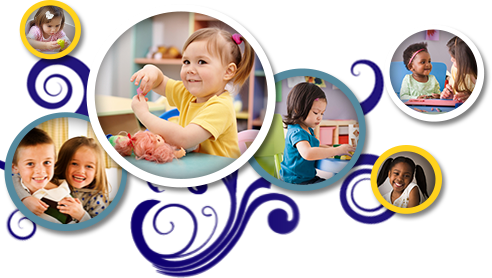Our Preschool
The DCLC preschool program introduces your child to critical learning concepts that they will be exposed to in K–12 education, including art, music, math, science, dramatic play, literacy and more. Our teachers utilize personal instruction, computer based learning programs, and a proven curriculum that will give your child many advantages in K–12 education. We offer full-time preschool, as well as our part time “Little Lambs” program.
Preschool I Room
Ages: 33 months–3 years
Licensed for: 10 children (1:10)
At David’s this room is the first stepping-stone into the wonderful world of preschool. Children are emerging right out of toddlers to this classroom and will stay here for a period of 1–1 1/2 years before moving into preschool II.
While you are busy going to work, your children are also busy at their work, which is play. Play helps your preschooler learn about her/himself and what she/he can do; learn about others; learn about adults; and learn about his/her environment.
The interaction in the room is much more involved, as your child’s skill level has increased rapidly. While the room arrangement provides for safety, it must also be interesting in order to encourage children to enter in. The preschool schedule is a little more flexible in order to meet changing program needs such as field trips or special events when they present themselves.
There are many opportunities to develop in the areas of language, science, math, art, and music as they are introduced into the classroom. Social skills are ever important, as they are getting closer to going to school. Emphasis is put on skills such as sharing, taking turns, respect for others and communicating problems to adults and peers through verbal communication. At this age, early childhood assessments become an integral part of measuring the child’s developmental milestones. Early detection is considered priority if special needs arise that needs to be confronted before entering school. This is also where Early Childhood Screening for Kindergarten will take place with the school district your children will be attending.
The children are being molded by all their new experiences and getting excited about all the new potentials for discovery that are constantly coming their way. The thematic units are similar but have become much more extended with activities that are more appropriate for their age. They will begin to abound more in the sciences and math is introduce on a broader base. Language and literacy take on a whole new meaning as they begin to start putting things together through their processing skills that are now heightened.
David’s maintains a no-time-out policy, which encourages children in preschool to either use their problem solving skills or be redirected by their teacher. We teach, practice, and demonstrate conflict resolution as teachers direct, role play, and re-enact the situations.
It appears at this age, that all we have been watching socially, emotionally, physically, cognitively, and spiritually suddenly awakens. They are growing like weeds and changing right before your eyes. We now start to see a glimpse of what they may become as an older child or even an adult. Their personalities are pretty much set by age three, so they tend to be a lot more entertaining. At this age, you can almost see the light bulbs going on as they learn new information. They are becoming more expressive in all areas of their emotions and socially are more attentive to friends as their compassion increases for those around them.
Preschool II Room
Ages: 4 years–kindergarten
Licensed for: 25 children (1:10)
We designed our preschool curriculum to prepare children to enter kindergarten—physically, cognitively, socially, and emotionally. Additionally, we strive to prepare these children spiritually, so they have a foundation to build on for a lifetime. Our hope is that each child graduates from our classroom personally experiencing the love of Jesus Christ and is familiar with the Word of God.
Children change a lot socially during this age—learning a lot about themselves and their peers. They learn how to express themselves and resolve problems. They also start to accept structure and understand routine, while still embracing creative play.
Children will be in this classroom until kindergarten. We grow close to the children during this time; they each have special and unique personalities.
